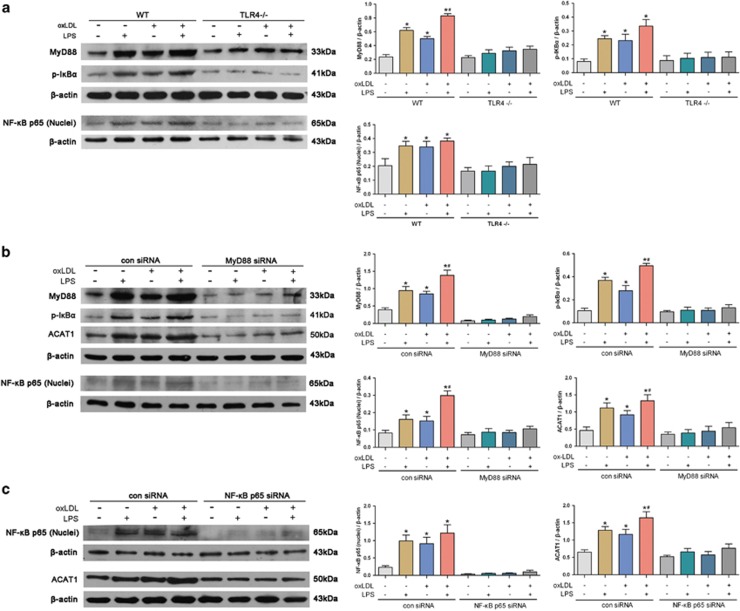Figure 5.
TLR4 upregulates ACAT1 expression via MyD88/NF-κB signaling pathway. (a) Primary VSMCs from WT and TLR4−/− mice were treated with oxLDL (80 μg/ml) and/or LPS (100 ng/ml) for 24 h. OxLDL significantly increased the levels of MyD88, NF-κB p65 (nuclei) and p-IκBα in VSMCs from WT mice, which similar to LPS-induced effect, and exposure to oxLDL together with LPS, had a synergistic promoting effect. In contrast, oxLDL and LPS failed to induce the MyD88, NF-κB p65 (nuclei) and p-IκBα expressions in VSMCs from TLR4−/− mice (*P<0.05 versus control WT-VSMCs; #P<0.05 versus WT-VSMCs with oxLDL challenge). (b and c) Primary VSMCs from WT mice were transfected with con siRNA, MyD88 siRNA or NF-κB p65 siRNA, and then treated with oxLDL and/or LPS for 24 h. In VSMCs transfected with con siRNA, oxLDL significantly increased the levels of NF-κB p65 (nuclei) (b), p-IκBα (b) and ACAT1 (b and c), which similar to LPS-induced effect, and exposure to oxLDL together with LPS, had a synergistic promoting effect. In contrast, oxLDL and LPS failed to induce the MyD88, NF-κB p65 (nuclei), p-IκBα and ACAT1 expressions in VSMCs transfected with MyD88 siRNA (b). oxLDL and LPS also failed to induce the NF-κB p65 (nuclei) and ACAT1 expressions in VSMCs transfected with NF-κB p65 siRNA (c) (*P<0.05 versus control con siRNA VSMCs; #P<0.05 versus con siRNA VSMCs with oxLDL challenge). Results were presented as mean±S.D. (error bars) of three independent experiments

